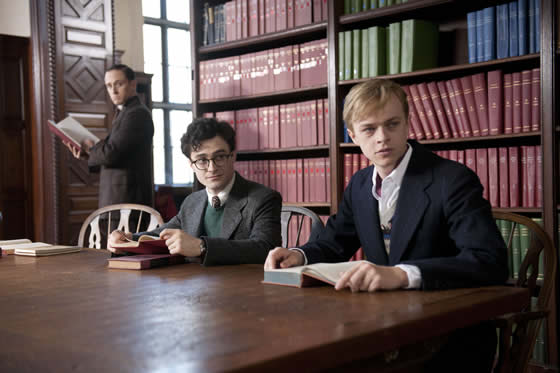 There’s been a constant stream of films trying to capture the seminal Beats: John Byrum’s 1980 “Heart Beat”, Cronenberg’s hallucinatory 1991 “Naked Lunch”, Gary Walkow’s (2000) “Beat” (about William Burroughs), Noah Buschel’s 2007 “Neal Cassady” Rob Epstein & Jeffrey Friedman’s 2011 “Howl”, Walter Salles’ 2012 “On the Road”, as well as Curt Worden’s 2009 documentary “One Fast Move or I’m Gone: Kerouac’s Big Sur” and Michael Polish’s 2013 “Big Sur.”
There’s been a constant stream of films trying to capture the seminal Beats: John Byrum’s 1980 “Heart Beat”, Cronenberg’s hallucinatory 1991 “Naked Lunch”, Gary Walkow’s (2000) “Beat” (about William Burroughs), Noah Buschel’s 2007 “Neal Cassady” Rob Epstein & Jeffrey Friedman’s 2011 “Howl”, Walter Salles’ 2012 “On the Road”, as well as Curt Worden’s 2009 documentary “One Fast Move or I’m Gone: Kerouac’s Big Sur” and Michael Polish’s 2013 “Big Sur.”
Few have studied the proto Beat days. Director John Krokidas and co -writer Austin Bunn’s script captures some of the spontaneous style of young artists sowing their first wild oats: the jealousy, betrayal and mutual admiration.
Daniel Radcliffe plays future-poet Allen Ginsberg, the son of noted traditional poet Lou Ginsberg (David Cross) and mentally ill Naomi Ginsberg (Jennifer Jason Leigh) who was repeatedly hospitalized from the time he was born to the end of her life.
Yearning to flee the melodrama of his Paterson, New Jersey home, Ginsberg is accepted at Columbia, where he is initiated into the nighttime world of literature, jazz and sex by toothsome esthete, campus bad boy Lucien Carr (Dane DeHaan). Carr introduces naive Ginsberg (beautifully played by Radcliffe) to his pals and fellow debauchees, William Burroughs (Ben Foster- who gets Burroughs bone dry delivery), ex sailor Jack Kerouac (Jack Huston) and the creepy lovelorn ex prof David Kammerer (Michael C. Hall), braniacs all. It’s fun to watch these icons in the making, especially watching young Burroughs called to heel by his father.
Carr lets Kammerer write all his papers, making fun of the “queer” who dotes on him, Allen, who’s discovering his homosexuality through his crush on the glamorous sophisticate, suffers along with Kammerer but dances to Carr’s tune. He’s irresistible, with his Rimbaud quotes and cutting quips, “She smells of imported sophistication and domestic cigarettes” Carr says dismissing a girl he’s kissed. Carr organizes a scandalous raid on Columbia library, replacing their famed document collection with “New Vision” Manifestos.
Anti Semitism and homophobia play in the background as Ginsberg comes of age, goaded into becoming a poet by Carr’s insistent hunger to illustrate his take on “The New Vision”, Carr’s answer to Yeats’ “A Vision”. First time feature director John Krokidas (director of the multi awarded shorts “Shame No More” and “Slo-Mo”) is good at creating the heady parties that served as backdrop for a generation of ambitious artists looking to shake free from the repression and conformity of Waspy post war America.
Huston) a fourth generation actor from the famed family, is magnetic as the young Kerouac, whose life is just coming into focus.
Although Carr claimed he never had sexual relations with Kammerrer, the film takes a different stance. Flamboyant Carr uses both Kammeror and then Ginsberg to draft the school papers that keep him from flunking out.
Son of divorced St. Louis socialites Marion Howland (née Gratz) and Russell Carr, Lucien became the idée fixeof David Kammerer, a childhood friend of William S. Burroughs, heir to the St. Louis Burroughs fortune, who knew the Carr family. Infatuated, Kammerer stalked the young man, following him from school to school, fueled by unrequited lust. The reportedly brilliant Columbia freshman introduced Ginsberg to Kerouac and both to his older decadent friend William Burroughs. Carr, the social glue of what Ginsberg dubbed “The Libertine Circle” developed “The New Vision”, a manifesto and call to arms to his circle of writers, and turned Ginsberg on to Rimbaud. The only key figure missing in this tale is street-smart hustler Herbert Huncke,
Obsessed Kammerer gave up his teaching post at Washington University in St. Louis, and trailing Carr, became a janitor at Columbia. Desperate to stop Carr from shipping out with Kerouac, Kammerer attacked Carr sexually, Carr killed him in self-defense with his Boy Scout knife, dumped the body in the Hudson. Kerouac disposed of the knife and other evidence. Burroughs and “23-year-old seaman” Kerouac were arrested as material witnesses. Burroughs’ father posted bail, Kerouac’s father refused. In the end, Edie Parker’s parents agreed to post the money if Kerouac would marry their daughter. The marriage was annulled in 1948.
Carr pled guilty to first-degree manslaughter and served two years in the Elmira Correctional Facility for the “honor killing”. Remaining friends with Kerouac. Lucien Carr spent 47 years with UPI, eventually heading the general news desk until his retirement in 1993.
Kerouac and Burroughs collaborated on the 1945 novel about the Kammerer killing “And the Hippos Were Boiled in Their Tanks”. Never published during their lifetimes the novel was finally published late 2008, after Carr’s death. Kerouac also later wrote about the killing in “Vanity of Duluoz”, the last work published before Kerouac’s death in 1969. Carr asked Ginsberg to remove his name from the dedication to Howl in 1956.

